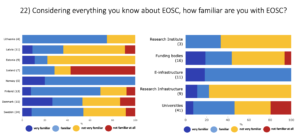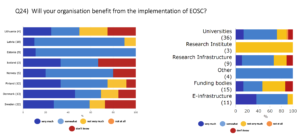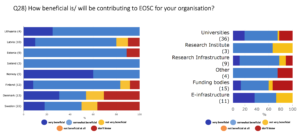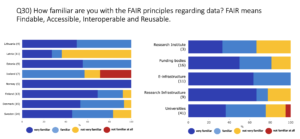Insights from the National Initiatives survey
During the autumn of 2019 and the spring of 2020, the EOSC-Nordic project, along with the other regional 5-b projects, performed the National Initiatives Survey. The survey aimed to assess the current state of national initiatives regarding topics such as familiarity with FAIR data principles, open research data and services in the European research infrastructure and e-infrastructure landscape.
The EOSC-Nordic version of the survey was distributed to approximately 200 organisations throughout the Nordic and Baltic region. The survey targeted universities, funders, e-infrastructures and research infrastructures.
The survey covered a range of topics including knowledge and attitude towards EOSC, adoption of FAIR and Open Science, as well as a range of topics covering e-infrastructures and research infrastructure services. There were many different questions in the survey, but some of the key findings regarding selected sections of the survey, specifically attitudes towards EOSC, adaptation of Open Science, and the FAIR principles are presented below.
Stakeholders and EOSC
In the ongoing discussions regarding the future of the European Open Science Cloud, stakeholder engagement is seen as a key to the success of EOSC. Therefore, all target groups within the frame of the survey received questions related to their attitude towards EOSC, expectations regarding EOSC, as well as prospective contributions to EOSC.

Among the respondents who answered, the familiarity with EOSC differs depending on which type of organisation they were a part of. Respondents from e-infrastructures tend to be familiar with EOSC, while respondents from funders and universities tend to be so to a lesser extent. A majority of the answering respondents are of the opinion that EOSC will affect their organisations and countries. A majority of the answering respondents are of the opinion that they will benefit from the implementation of EOSC. Likewise, a majority of the answering respondents view themselves as likely to contribute to EOSC and believe that contributing to EOSC will be beneficial for their own organisation.


Open Science and FAIR
A key focus in EOSC is the adaptation of Open Science and the FAIR principles to facilitate a European web of research data.
Within the frame of the survey a number of questions related to both Open Science and FAIR were posed to some of the target groups. A majority of the answering respondents are familiar with the FAIR principles. Regarding adoption of FAIR, and publication of data in repositories, a majority of the answering respondents either encourage, or have regulations in place.

Regarding Open Science a majority of the answering respondents also either encourage this, or have a policy in place for open access to publications, research data management, open research data, as well as for long term availability of research data.
Overall a good knowledge of EOSC
The National Initiatives survey covers a wide range of topics. Regarding knowledge and attitude towards EOSC and adoption of FAIR and Open Science a key finding is that answering respondents have knowledge of EOSC, expects EOSC to be beneficial to the organisation, and are in various stages of adaptation of Open Science, and the FAIR principles.
The survey has helped the EOSC-Nordic project, as well as other projects, and the EOSC landscape working group, to better understand the stakeholders knowledge of, and attitude towards EOSC. The collective results from all the regional projects, including EOSC-Nordic, will assist the EOSC Landscape working group with valuable input to a report that will supplement the Landscape report.